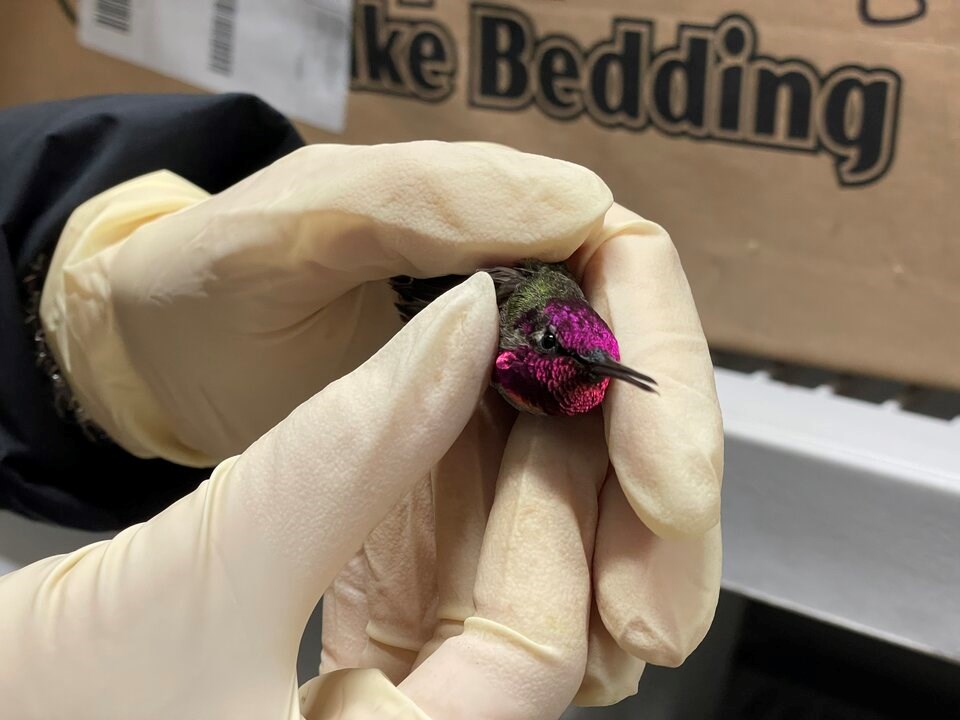A group that cares for injured wildlife says it’s concerned extreme swings in temperature seen in British Columbia this winter are disrupting the life cycles of some bird species.
Kimberly Stephens, the hospital manager at the Wildlife Rescue Association, said they have received a reports of early breeding among wild geese at least a month earlier than normal.
“It’s kind of all over,” Stephens said. “We've gotten calls for babies who are in distress or just even sightings of young babies at this time of year, which is not something that we typically see.”
The reports come amid a difficult winter for hummingbirds. In January 2024, the association took in 33 of the small birds after a stretch of cold weather descended across much of the province. Some came in very cold and with low blood sugar, while others were admitted to the hospital with injured tongues from frozen bird feeders, she said.
Climate change impacting number of animals in rehab, says group
The Orphaned Wildlife Rehabilitation Society (OWL), located in Delta, B.C, rescued baby barn owls during the last big snowfall, according to general manager Rob Hope.
“They were basically breeding in winter. It’s not that normal,” Hope said.
Stephens said another problem facing birds after heavy snowfall came from the reflection in the glass of buildings — on sunny days, the snow’s reflection on highrises makes them hard to see, leading more birds to crash into windows, and if they’re lucky, land in the animal hospital.
As the temperature swung from cold to warm in recent weeks, on the ground, snakes have been spotted coming out of a natural state of torpor known as brumation. Stephens says she worries that if the temperature swings cold again, the birds born early this year might have a “really low chance of survival.”
“We've definitely seen an impact from climate change on wildlife in the area, which in turn has caused an influx and the number of patients that we've seen,” she said.
A spokesperson for Birds Canada said “we may be hearing” of early breeding in B.C. bird populations, but that they have yet to analyze data to substantiate the claims first hand.
'They might get tricked'
According to University of British Columbia conservation biologist Peter Arcese, birds breeding early could be the result of two phenomena.
Arcese said humans putting out bird feeders year-round allows hummingbirds to breed over long stretches. In that context, seeing young hummingbirds at this time of year is not completely abnormal.
But that’s not the case for many native bird species that breed with natural cycles of abundance in food. Spells of warm winter weather can trigger plants to bud early — a climate effect that can be seen in an increasingly earlier peak cherry blossom season. The supplemental food can signal to birds that spring has arrived, and prompt early breeding, said the biologist.
In both cases, if a late cold snap arrives, species can get caught unprepared.
“They might get tricked,” Arcese said. “It could have a population-wide effect.”
The prospect of a warming planet shifting the range and life cycles of birds has grown substantially in recent years.
Last year was the Earth's hottest year on record, with average global temperatures likely reaching their highest point in the past 120,000 years, scientists have found. Birds are among the first to feel those effects.
In B.C., current warming trends suggest between 34 and 94 bird species are high risk of losing their current range, according to the National Audubon Society.
As some birds face the threat of extirpation from their B.C. ranges, others have unexpectedly shown up. In 2022, a prothonotary warbler was spotted in a Vancouver parking garage at a time of year when it should have been in Central America, a spokesperson for the Wildlife Rescue Association noted.
Low snowpack concern for eagles
This winter, swings in temperatures appear to have even thrown off local bird migrations. Hope said eagles arrived from northern B.C. later than normal, and suspects it was because rivers — and prey within them — remained ice free longer.
With B.C.'s average snowpack 61 per cent of normal more than halfway through the snow season, Hope’s biggest concern is whether there will be enough water in streams and rivers for migrating salmon — a major source of food for eagles.
“With the weather changing, some of these birds get hooped,” he said.
Arcese said he’s looking to rivers on Vancouver Island, where snowpack is among the lowest in the province and where young migrating salmon could face significant water shortages.
“In the Cowichan River, it’s quite likely we will have people bringing smolts in buckets down to the sea,” said the biologist.
Hope said all his team can do is brace for more underfed and dehydrated birds in need of help.
“The food bills will go up. The time will go up. But we’ll always be here for animals that need us,” Hope said.
His message to the public: “People, keep an eye out for the animals in trouble. Call us.”




